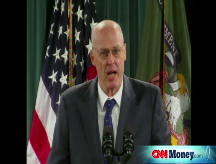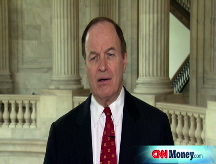Will it work?
More questions than answers about how effective the federal bailout plan will be.
NEW YORK (CNNMoney.com) -- Experts are cautiously optimistic that the massive federal bailout of the nation's financial sector will solve the credit crisis that hit Wall Street this week.
But questions remain about whether it will prevent more failures of banks and Wall Street firms and many doubt this will lead to a quick turnaround for the battered housing market.
The plan, sent to Congress by the Bush administration late Friday, calls for the federal government to buy as much as $700 billion worth of mortgage assets held by banks, Wall Street firms and other financial institutions.
Those securities were backed by home loans, many made to buyers with bad credit or without proof of income. As housing values fell and foreclosures shot to record levels in the past two years, the value of those securities plunged. That in turn caused massive losses in the financial sector.
This past week it reached a crisis situation. Banks and investment firms stopped making the loans to each other as they hoarded cash to protect against any sudden liquidity crunch as well from unknown problems on their partners' balance sheets.
Treasury Secretary Henry Paulson and Federal Reserve Chairman Ben Bernanke won support for the bailout plan from Congressional leaders in a meeting Thursday night.
Congress began working on the legislation Saturday, and there could be a vote as soon as the coming week.
"I am convinced that this bold approach will cost American families far less than the alternative -- a continuing series of financial institution failures and frozen credit markets unable to fund economic expansion," Paulson said Friday. "I believe many members of Congress share my conviction."
Word of the plan first leaked Thursday afternoon, causing a massive rally in stocks at the end of the day that carried over into Friday. Several economists also praised the move.
"I'm confident this will work," said Mark Zandi, chief economist with Moody's Economy.com. "The federal government is committed to backstopping the nation's financial system and will do whatever is necessary to make sure the system does not unravel. The details are important but secondary."
The plan also won support from presidential candidates John McCain and Barack Obama. Zandi is an informal economic advisor to the McCain campaign.
Other experts said that while there are obviously big risks to taxpayers, the federal government has little choice but to provide the assurance to financial markets.
"If this doesn't work, we're in trouble, because there's not much more the government can do," said Jaret Seiberg, a financial services analyst at the Stanford Group. "They've left very few arrows in the quiver."
But Seiberg added that the bailout won't completely end the recent turmoil on Wall Street, a crisis that began with the Treasury's seizure of mortgage finance giants Fannie Mae (FNM, Fortune 500) and Freddie Mac (FRE, Fortune 500) earlier this month and escalated this week with the bankruptcy of Lehman Brothers (LEH, Fortune 500) and the $85 billion loan to American International Group (AIG, Fortune 500), the world's largest insurer, by the Federal Reserve.
"What the government is doing now is not suddenly going to make institutions profitable," he said. "What we're talking about is trying to make them stable. That means removing the risk from their balance sheet and putting it on the taxpayer. The government has a much better ability to hold onto that risk for an extended period of time."
Still, Seiberg is optimistic that the bailout will help home prices finally start to recover since it should lead to lower mortgage rates and improve consumer confidence.
But others say that there are still enough fundamental problems in housing, including a huge glut of homes for sale and the likelihood of more foreclosures in the pipeline.
"It should help housing prices find a bottom but I still think it will be about a year from now -- and after prices decline another 10%," said Stuart Hoffman, chief economist for PNC Financial Services Group.
Nonetheless, even if home prices don't stabilize soon, one expert said the bailout could be a success if it allows bank to stop hoarding cash and once again begin lending to each other, consumers and businesses.
"The one thing you don't want is to have the economy grind to a halt because people can't get credit," said Dean Baker, co-director of the Center for Economic and Policy Research.
Baker predicts home prices will fall another 20% even with the bailout but said the decline could become even more severe without passage of the rescue plan.
"Housing prices were a bubble and you can't stop them from deflating," Baker said. "But [the bailout] might stop an uncontrolled plunge."
Despite the support being voiced by Democrats and Republicans for the plan on Friday, Seiberg said its chance of passage is by no means certain.
"The odds of this passing are probably around 80% - and those are pretty good odds for Washington," he said. "But it's not a slam dunk."
Sen. Richard Shelby, the ranking Republican on the Senate Banking Committee, questioned the plan Friday morning, telling CNNMoney.com that he doubts it will be the last federal bailout in the sector that will be needed.
"Secretary Paulson and Chairman Bernanke have not said ...this is going to contain everything," he said. "They're hoping it is. What they're doing is jumping from crisis to crisis. I haven't seen a comprehensive plan yet."
He wouldn't commit to supporting the measure.
"This is too big to just accept without knowing what it does, who pays for it and is this the end of it," he said. "It's true that there's stress in the financial markets. But should we bail out everybody? We know it's important to the financial system, but at what price?" ![]()



